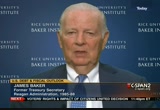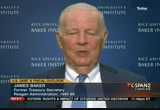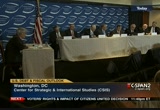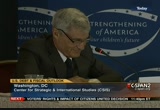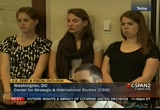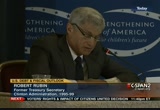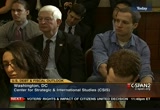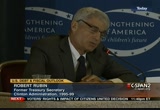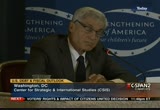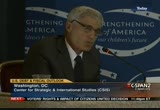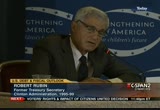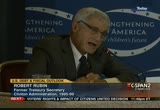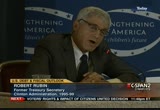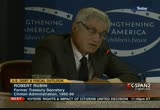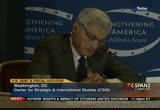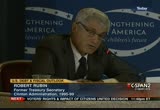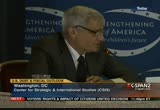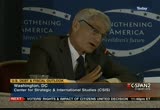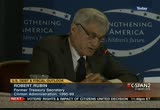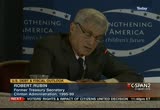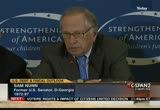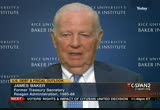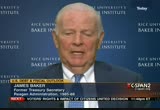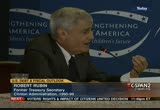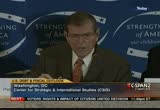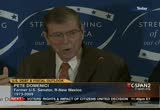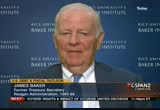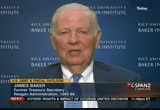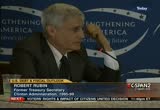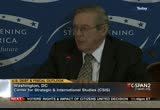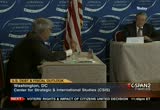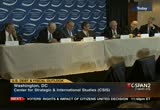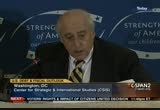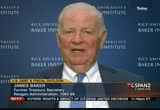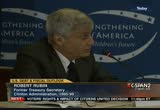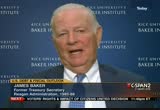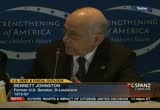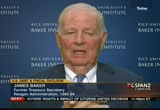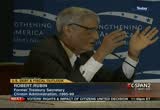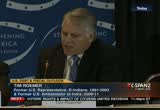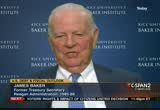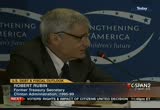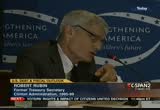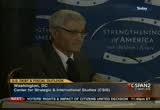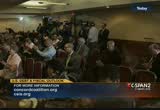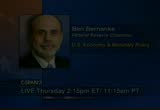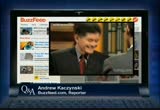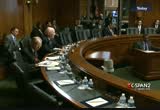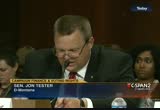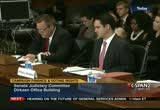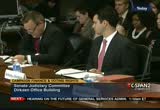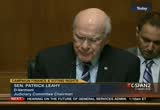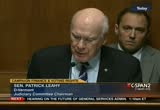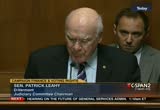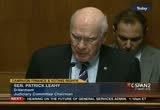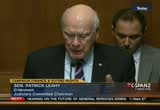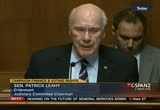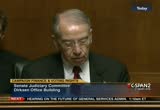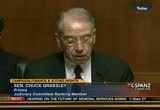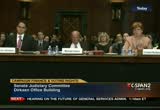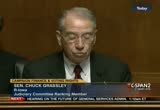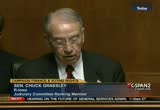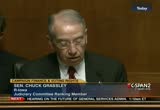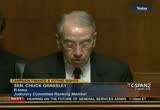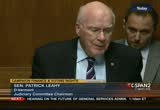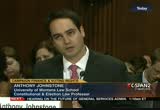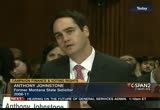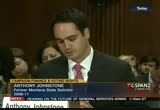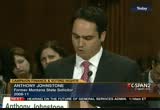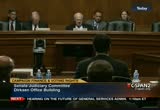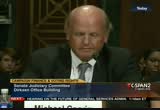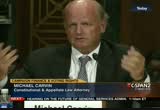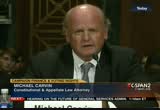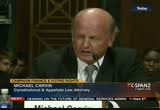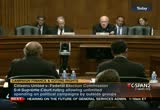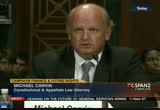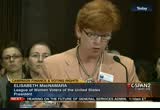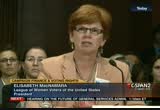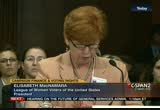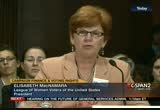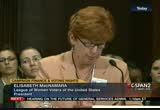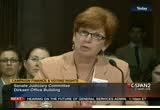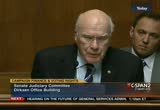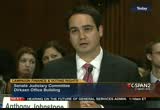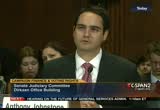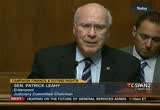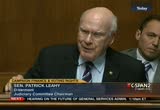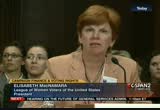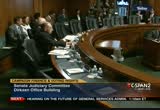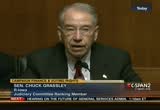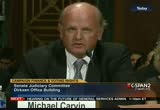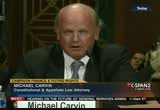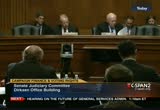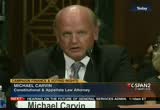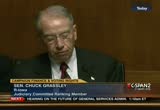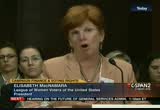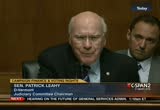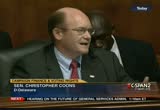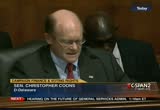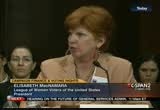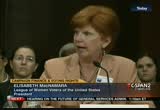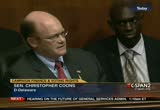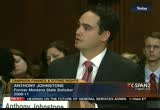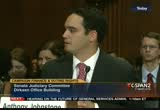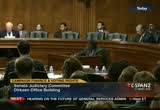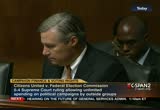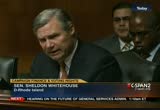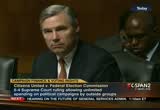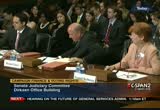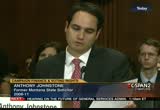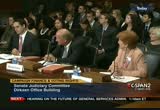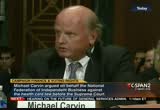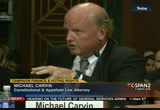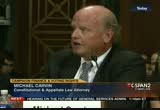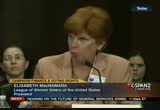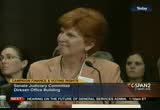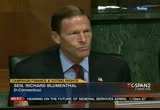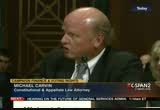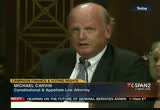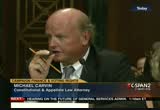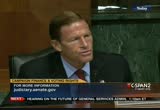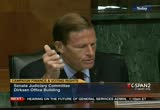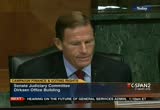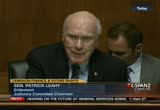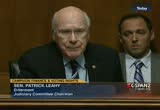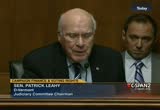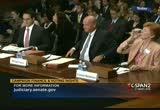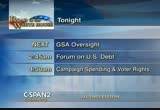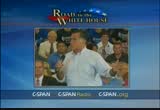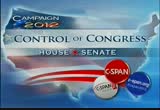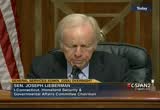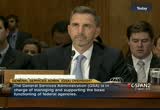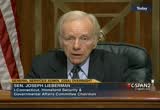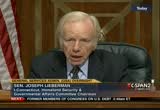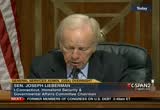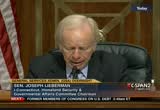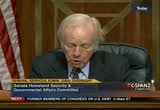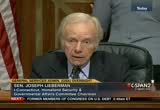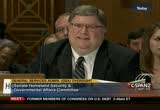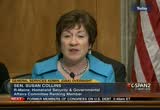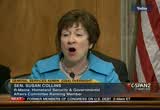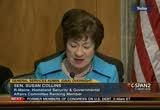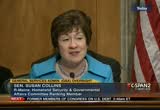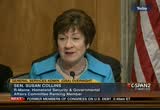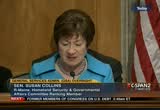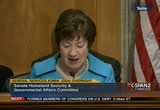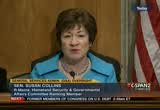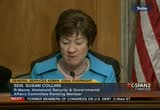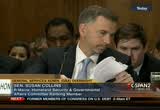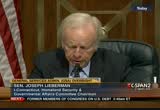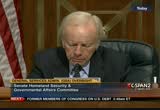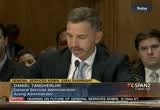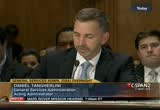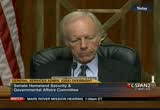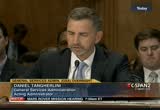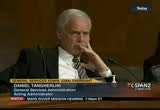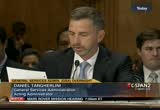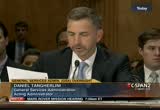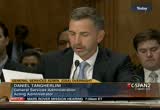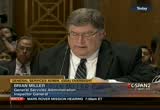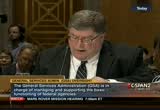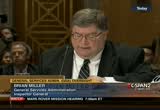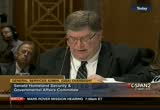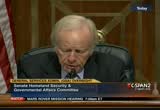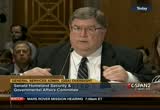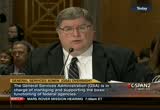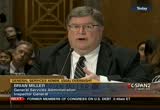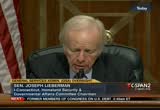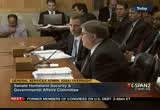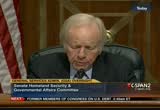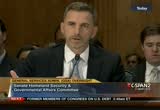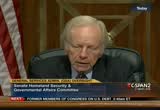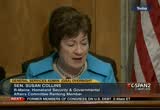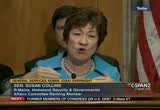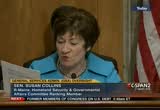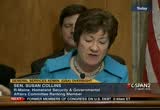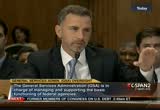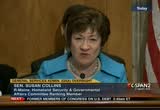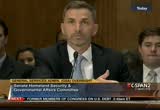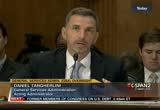tv Capital News Today CSPAN September 12, 2012 11:00pm-2:00am EDT
11:01 pm
the. >> we have on our left and you're right another very distinguished american citizen who has come to join us and share his wisdom with us. he is the chairman of the council on foreign relations and the former secretary of the united states treasury. he joined the clinton administration in 1993, serving in the white house as an assistant for economic policy in the first director of the economic council. he served as our nations secretary of the treasury from
11:02 pm
1995 to 1999 and from 1999 to 2009 he served as a member of the board of directors and a senior adviser to that company. from that point on, he has served in various communities and community organizations and at this time, those who need his talent. we are privileged here to have a distinguished american with us take his time and service about this issue which we believe is so important to our country and our future. thank you for joining us and thank you for testifying before us. we appreciate your presence. >> one word, i think the secretary treasurer -- the last time we were trying to figure out what was going on -- >> that is true, sam, we decided to do something to get rid of them. >> we are glad to have you. >> he knows about budgets
11:03 pm
because he led an executive branch until four consecutive balanced budgets. that is pretty impressive. >> thank you. i do have a set of comments i would like to make. a subject that i have given a great deal of thought to. i think all of us agree that we should have a progrowth economic policy and even though there are some differences about what that policy should be, that needs to be resolved to compromise. i would just remind all of us that in 1993 we put in place a deficit reduction program that raised rates on the most affluent. it was 50% revenue increases and that created the longest economic suspension expansion in american history.
11:04 pm
it is important to keep this in mind as we decide what we want here. our country is at a historical crossroads. a dynamic society. fast natural resources and i believe that even a transforming global economy, if we are going to reach that potential come we have three great challenges. we have to address in an unsustainable trajectory. secondly, we need robust public investment in areas that are critical to economic growth, education, infrastructure, basic research, and so much else. third, we need reform in areas that are important to our economy. integration and much else. i believe that the most fundamental challenge and it will be ultimately ruinous as
11:05 pm
our fiscal trajectory. it poses multiple risks in which some are already materializing. first is the interest rate structure that is inconsistent with growth. secondly, severe destabilization, and this is the most dangerous. about bond markets, currency markets, economic conditions and the economy. and demanding and undermining our financial assistance to deal with economic difficulties or as tim said, dampening business confidence by heightening uncertainty by future economic conditions and heightened concern about whether or not the system can work. fifth, our capacity for public investment and for national security.
11:06 pm
high interest rates, lacking confidence, and as a consequence of that, low growth. number two, high inflation at some point if we try to monetize our way out of debt. number three, severe crisis in our bond and currency markets that will inevitably lead, and i think very quickly come into deep recession. number four, some sequential combination of these consequences. the longer we wait to act, preventively, the deeper the hole becomes come the harder to regain confidence, and the harsher and more protracted responding measures will have to be. and if we don't act preventively and are forced to act in response to crisis, the measures required will be far more extreme.
11:07 pm
i do believe that to allow more time for recovery, it would probably make sense to enact a program now with deferred implementation for a limited. a. of time. someone mentioned one comprehensive program on the panel before. otherwise, we lose trade opportunities. elected officials and journalists often will say privately that they think that there are systems that are incapable of acting on these issues without a crisis. but i believe that that you vastly underestimate how severe crisis by being and how harsh the responding measures may be required. the substantive issues and resolving our fiscal situation
11:08 pm
are obviously difficult. i believe it is resolvable. the highly conservative economists said to me not long ago, and i think he was slightly exaggerating, but i think his point is right, that he and a pragmatic liberal economist got together, they can put together the pieces of an effective fiscal program in the day. that means making politically tough choices and very importantly, as jim said, it means working across party lines and different opinions to reach common ground. our nations founding fathers strongly disagreed on many fundamental issues, but they
11:09 pm
worked together through a sweltering summer in philadelphia with delegates often yielding substantially on matters they care deeply about. in that context, let me expand on two issues. both of which have already been common. tax expenditures and spending cuts. many alum and a tax expenditures. sometimes without specifying the particulars, and anything without the discussion and the recognition of substantive
11:10 pm
effects and reality is that i believe should be done in an area that is focused on with such great intensity. i also believe that the effects of tax expenditure cuts and limitations are almost surely not well understood by those and probably not well understood by most expert adjectives. long-term standing debate about spending cuts and income tax rate increases and proposing other tax measures and the like. however, in my view, there are tough choices in many ways. these measures may be politically undoable. if adopted, abandoned or it
11:11 pm
abated, unless the substantive effects and the political realities are fully laid out and fully understood. tax expenditure reduction is a path to reducing tax rates and attributing revenue to deficit reduction. that is an appealing prospect. but it is a poor reward her. tax reductions can contribute to a fiscal plan and it is a very useful approach in the number of plants that have been put forth. but they are not a silver bullet. given the barriers to eliminating or reducing ms. castor expenditures, and may prove
11:12 pm
this per annum number is far less than many of the numbers that have been put forward. tax expenditure advocates argue correctly -- reducing the more than research numbers suggest. i think that judgment can only be made when i'll tax expenditures are sent out with great specificity and to what they will be unless they will cost and how much they will cost, and provide a clear basis for their effects on the political realities. as the spending cuts plans generally tend to be brought and not specific, at least with respect to some areas.
11:13 pm
most plans have spending reduction numbers that say would be congruent to the substantive effects and would be politically unrealistic. as with tax expenditures, only analysis of the specifics could provide the basis for an informed judgment and informed decision-making, because the numbers and pieces in the budget on the spending side are so large, as you probably need, represented with examples. my next point is controversial. but i believe that the numbers truly show and i think that most mainstream analysts would agree that it is impossible to meet our fiscal objectives with services expected by the predominance of americans across
11:14 pm
the philosophical spectrum, unless we act on all fronts. these funds are serious cost containment, the so-called nondefense discretionary budget, entitlement reform with health care programs and social security on sound financial footing, reductions in defense and its significant increase in revenues. those who reject the need for tiedemann increases or reform take on the obligation to show the full specifics of an alternative substantive effects that are fully understood and politically doable. every budget reflects views as to the fundamental objectives. mine would be growth competitiveness, increased living standards, reduce inequality, and a financially sustainable social safety net system with our values.
11:15 pm
my preferred fiscal program would be roughly 10 years of deficit reduction. the debt to gdp ratio, i would enact that now, but as i said earlier, to defer implementation for probably two years with an enforcement mechanism that was real. >> mr. rubin, would you go back for about seven seconds. >> i would be delighted to do that with these. >> [inaudible question] >> i think he was talking about the fact that probably goes who need entitlement cuts -- [talking over each other] >> as we know, there are many in
11:16 pm
one party who think we should increase them and those who think we shouldn't. i believe that those who reject the need for revenue increases and those who reject the need for entitlement reform have the obligation to show the full specifics of an alternative where the effects are understood and it is politically doable. >> thank you very much. we better have some more information on the next forum. >> that lies at the heart and resolving difficulties between the two parties. >> i do believe -- i would move for critical public investment what we had in 1993, which is a 5050 split between revenue increases and spending cuts. and i would go back to the 1990s, which were predicted at the time to be ruinous to the
11:17 pm
economy did instead what we have is the longest economic expansion in american history with a man's job creation. many would disagree with my view. but it seems to me that individual views are not the point. the imperative is for elected officials in all of us to work together in the spirit of our founding fathers and to move to sound fiscal regime. for later decades, as we all know, health care entitlements are increasingly central to our fiscal position and their growth comes primarily from the rising costs and overall health care system, and i believe everyone agrees that more must be done to address those increasing costs a sound fiscal regime, a sound fiscal regime is central to reducing the economic duress which is creating economic hardship for many americans.
11:18 pm
there is an ongoing debate about whether the immediate emphasis should be on jobs and growth or deficit reduction. i believe that is a false choice. our fiscal outlook undermines confidence, as i said earlier, both because it creates heightened uncertainty about policy decisions and considerable concern about whether our political system can work. i don't think we will have a healthy ongoing recovery until our fiscal opinions are in order. i do believe the stimulus, would be far more effective if combined with serious deficit reduction program in the confidence that would bring. many say that the so-called fiscal cliff with its expiring tax cuts and the sequester and the distance from the next election creates an extraordinary set of conditions across party lines and different
11:19 pm
opinions to meet our fiscal imperative. this is an opportunity that i believe all of us, in and out of government must do everything in our power not to lose. thank you very much. [applause] >> thank you, bob, and thank you jim. if we could put jim bakker jim, i hope you were able to hear. i want to make sure that everyone has a chance. the dog with a less fleas or whatever from the world is a fragile place in the bond markets have a lot to do with the discipline on countries and in europe, and we are seeing now before our very eyes. do any of us want to venture how
11:20 pm
much time we have? is this an urgent matter? or do we have an unlimited amount of time? a lot of time before america starts being a place where people don't want 212, and of course, we will have a chart leader that shows about 20% of our foreign debts held by china now and 20% by japan, in that neighborhood. it is staggering us what is happening out there. would either one of you book -- perhaps commenting on the global implications on the economy? >> well, i don't know how much time we had. i don't know anybody that would know how much time we have. all i can say to you is that a sovereign debt crisis can hit pretty quickly. a fiscal crisis can come along fairly quickly. look at what happened in 2008, right here in this country in the world economy for that
11:21 pm
matter the longer we go on like this, the greater risk we take. that something truly a verse will happen. that is why i agree with what bob said, that we are approaching an opportunity and a time of opportunity to shift down in the aftermath of our presidential election and with another four years before the next one, i'm not suggesting we can get this done in the lame-duck session of congress, but it is an appropriate time for us to wake up for the fact that this is -- this crisis we're in right now, this fiscal shape we are in, it could easily turn more into a sovereign debt crisis or a crisis not unlike what happened in 2008. the time to act is now. and i agree with what bob had to say about everything and how it ought to be on the table. absolutely everything. the only way we're going to get
11:22 pm
there is through good leadership in good faith and the ability to sit down and negotiate the problem between the parties. >> thank you, jim and bob, would you like to, and i'm not? >> listening to john, i wish he was leading the nation's efforts. let me make two comments, if i may. i used to run training operations. markets today have been very much affected by the european crisis. money is coming here as a safe haven. but we still have time. look what happened in europe. greek bombs were treating almost no spread to german bombs. all of a sudden, everything blew up. things can happen dramatically, suddenly, and with enormous magnitude. and there is no way to predict it. somebody said the other day that
11:23 pm
markets do what they do until they don't. that can change very quickly. we have time now to do this, which europe is does not have. we have time to do this in a careful thoughtful face conaway. when we are giving up that time, the longer we wait, as to when it will happen, i don't know. obviously the odds are greater a little bit further out than they are right now. those odds are greater as time goes on. but i think it is inconceivable that we would not have a far harsher crisis than almost anybody imagines him as we fix that problem and as jim said, the longer we wait, the harder, conversely by doing it now, he gives us more time to do it in a fashion with thoughtful decisions. this really would be a tragedy if we give up this opportunity. >> let me ask both of you, do
11:24 pm
you have any advice on how we can better make the american people aware of what we've gone on our hands and what we should do about it? it appears to me that americans, while they see some things that they are worried about, unemployment would seem to be something that is sticking, and people hope it will go away quicker. they see that. and they are worried. americans are worried about something going wrong. but we can't wait until we fall off the cliff to solve the problem. that is why we are doing this we can wait for the cliff and have one of these meetings and then we could have big meetings to put it together. but you are telling to put us together now. put this together now. can you use some additional words to tell the american people how bad it could be?
11:25 pm
they don't seem to appreciate, i don't think, how bad it could be. do you think you could share something with us? >> why don't we start with jim as our sr.. >> not by age, by the wisdom. >> i don't think you can do much more than what you are trying to do. what everybody involved in this event is trying to do. and that is generated attention to the problem and point out the importance of it in the diurnal solvent. that is what we have to do. i made a comment that was a little bit pessimistic when i was talking to you during my time there when i said that i said it i think if we continue with divided government, it's going to be very hard to get to a grand bargain. that's what i happen to believe as someone who has had a fair amount of political experience up there. i wish that were not the case. but if it does happen, then i
11:26 pm
think that we need to do everything we can to focus the attention of the american people on the importance of whoever doesn't want to come to the table, focusing attention on the importance of encouraging and prodding and promoting and cajoling that group to come to the table. that is all i know. >> thank you. this is an extraordinarily serious problem. i mean, if i was advising the president of the united states, the new president of the united states, whether it is the same one we've got now for a different individual, i would say that you have three huge problems in this country that you need to address. the economy, the economy, and the economy. and particularly, are taking
11:27 pm
debt timebomb. we have to deal with it. and i think all we can do is the kind of thing we are doing right now. those of us who have access to the people who'll be the decision-makers in the next government can do whatever we can to try to promote that idea with them. that's all i know to say the amount would you like to add to that, bob? >> the only thing i would add, and sam is basically in agreement with this i think you all can play a ruinous, and i know there is an effort to raise and put in place a very large effort to try to persuade those in public office to come together and compromise. i think after this election, anyone in our society, everyone rests on the ability to relate to the political system we really ought to have only two priorities. the first is to compromise and
11:28 pm
work with each other and govern effectively. number two is to solve the fiscal problem. and i think you have got it exactly right. the american public needs to be better educated about this issue, and i think equal who can best do it our elected officials because they tend break through most easily. i think all that she tried to persuade our elected officials that that is what they should use their bully pulpits for. thank you, bob. okay. alphabetically, we will start with bill. >> is a republican from tennessee. the audience may not know or had an outstanding member. bill was one of the leaders including the budget committee. we didn't even have a budget back then. [applause] >> i'm not sure if anyone in this room would argue to the
11:29 pm
point that we need to get this bargain. i think some parts were challenges. i do have one question in that regard. you talked about the difficulty in dealing with what i call subsidies in the tax system. tax expenditures, whatever you want to call him. most of the conversations have been on removing those tax expenditures on the personal side. i want to talk about the corporate side. because it does seem to me that maybe we have a better shot performing that. i'm not sure how you do that without getting rid of some of these tax cuts for corporations. it seems to me that that's a good place to start. >> bill, i agree with that. i do agree with that and i do think you could lower the rate.
11:30 pm
but if that is going to be deficit neutral, which generally that seems to how it is being approached, it is not contributing anything to the fiscal problem. >> there are the inefficiencies of the system that is distorted. >> i think that's fine, i agree with you. but it doesn't address and address the issue we are convened here to discuss. that's the problem. >> okay. >> gentlemen, thank you for your testimony. it has been wonderful. and i don't want to diminish the effect by asking any questions. thank you. [applause] >> the first time i ever heard the sitting members of congress. >> is that the bill frenzel that i know? >> i'm not from the bill frenzel
11:31 pm
school. it just seems to me, jim baker talked about divided government and bob rubin talked about the political system and whether we are capable of doing it, you know, the problems are not rocket science to solve. this is not like finding a cure for cancer and we kind of all know what to do. the question is, will our political system evolved to the point that will allow us to make these difficult and tough decisions. you both have been leaders in the private and public sector. you know what we do ship requires to get things done. and what teamwork requires. i guess my question to you, and maybe it is self-evident and you have marty talked about it is what are the incentives are leaders to act like leaders? when we have a very risk averse political system. you presented the problem is serious and catastrophic if we
11:32 pm
don't do anything about it. that is what leadership is for. i would say to you that if you were advising the next president of the united states and you kind of alluded to this, i think the president has to really take the lead on this. and set the direction is most ceos do. what we do to get leaders to act and operate in this environment and affirmative and assertive way? >> well, i think i may have said it. you have to simply continue to hammer home the potential consequences of inaction. and they are catastrophic. and i don't think -- you know, my sense is that regardless of how our election turns out for the president, the new chief executive will want to find a way, if he can, to deal with this problem.
11:33 pm
i am pessimistic only if we continue to have divided government. if we don't have that, i think we have a real opportunity to lead and to get something done. i would hope that we would have it even if we have divided government. but i suppose that remains to be seen. >> three quick points, if i may. first, i do think the next president -- that this problem isn't solved, i think the next president will have four very hard years. this will undermine everything the president wants to do. number two, a friend of mine for many years from a very distinguished former senator said that when he was there many years ago, it was always very partisan. at the end of the day, most senators had a commitment to govern and they got together and on most issues they were able to move forward.
11:34 pm
maybe it is just really looking in the mirror and deciding that i am here in in the final analysis to do it the country needs. and jim alluded to this, if enough public pressure can be created, it may change the political calculus of those in office to feel that they have been a compromise, otherwise they might not be in office for much longer. >> thank you, jim and bob. >> excuse me, jim. >> yes? >> i was just going to say that one of your speakers earlier, i think a former congressman and tennessee, referred to the supreme court decision in baker tennessee, referred to the supreme court decision in baker v. carr and talked about how how the redistricting process we have in this country is exacerbating the problems of our political dysfunction.
11:35 pm
because our campaigns now revolve around the primaries and not the general election. we don't have many truly competitive seats anymore. but people say, what can we do to correct it? you can't do without without a constitutional amendment, which is extraordinarily tough to get. >> mr. johnson from louisiana? >> if it is a disaster to go over the fiscal clip, which we agree that it is, and if there is not time to deal with the grand bargain and the lame duck, the question is what we do in the lame-duck? that is the emergency now. do you agree with me that we can accomplish two things. first, get a goal as to deficit reduction, $4 trillion is what simpson-bowles has over nine or 10 years. secondly, did a matrix, a procedure by which the congress would act next year.
11:36 pm
.. let me tell you what i think is going to happen. i think there will be a much greater focus on this problem right after the election. there won't be time during the lame-duck to get any substantively done about it, but there will be a recognition that we have to move the class so so that we have time to deal with it and deal with it can affect
11:37 pm
that an orderly way and i think that is what is going to happen. >> bob. >> yacht, jan, i wrote an op the net for "wall street journal." i agree with jim. y'all know far more about the legislative process than i do. one approach is to be to do for the here and couple months. instead of having lame-duck you would have lame-duck in a couple months. the pressure of the fiscal cliff in new orleans giving any. it's deferring up for two months. i'm not so sure we won't go over the fiscal cliff briefly because it may be brought prensa reasons one party decides to negotiate. thirdly, i think the idea of doing something general and then deferring its completion gets to
11:38 pm
be troubling to me. i think again you know what far more of legislation. six months down the road from eight months down the road. further away from the last election. i've a feeling would be inclined to postpone things. i think this initial period you put in something that at every piece, but it can be dirty dozen feet in the air. it has to be applied to specificity to it. one should consider -- i'm not sure if it's the right idea. it's not a bad idea to do for the end of the year for a couple months. >> hospital have been. >> yakima thank you, senator. two both jim and to bob, you have really outlined eloquently and articulately your economic credentials and your expertise here.
11:39 pm
what are you more worried about now? the academic fundamentals or parts of the political dysfunction on capitol hill? into the political dissolution and gridlock, how do we talk about the answers to the fiscal close and to do justice to an optimistic and positive ways. job growth, economic competitiveness, things that will give the legislator's intention that will rewarding to them and hopefully increase the cascade of both pressure, but also opportunity and optimism for them? >> jim. >> that is going to be a part of the debate. it seems to me, 10, in my remarks i outlined for you my view. bob and i will probably disagree
11:40 pm
on some of these issues. in fact we do it with the discussions it before. my view is you need to put in place programs economic policies and reducing marginal tax rates, the most pro-growth economic policy you can come last. now bob may not agree with that, but i think we just keep making that case. you must first of all what we worry about us, economic or political. i worry about the political dysfunction right now. if we can cheer the political dysfunction, we can solve the economic problems to the mechanism of a grand bargain that has everything on the table, nothing excluded. >> bob. >> this is not an exact quote, but a fairly recent paraphrase. president clinton used to say
11:41 pm
exactly what jim said. if you can't sell politics can never get good policy. i agree the political dysfunction system is the ultimate challenge in fundamental problem. i think you can express all of this in the way the votes of us have. i really think we are heading, forget the fiscal cliff, i think we are heading into virtually certain crisis. as i said, of tremendous importance and summoned her to couple moments. you can turn that around and say if we do the right thing we can get the benefit of increased confidence now. you can argue that both ways. increase confidence now and that would help improve our economic position. i think actually perhaps significantly. and we can build on our enormous long-term strengths so we can be successful must transform the global economy. take all the negatives and turn them around and express them in
11:42 pm
positives. either way, here is that this spirit i do agree with jim on the ultimate challenge. we can get a virtual responsibility and growth. we been given a mulligan in terms of energy. beginning with the abundance of gas can make one of the most competitive industrial nations in the world. we have that opportunity. so there's some really good things that can happen, but this problem has to be dealt with first. i want to begin, jim, thank you for being here. i know you have a pretty busy schedule. we deeply appreciated. jim, thank all the folks at the institute for joining in as a cosponsor of this forum. again, what you think concorde coalition, csis bipartisan policy center, the baker
11:43 pm
institute, and the belford center, the institute at stanford and those who individually have made to suffer possible. we thank you all for being here. pete, last word. >> i think everyone as you did to say this is a terrific start. perhaps we're going to find some to turn into a radio where will find them beautiful light at least i hope so. and i want to say that i believe this problem can be solved. i'm going to throw the word that was invented by me in the budget act called reconciliation. i believe what were talking about is the possibility that someone will find a way to bridge this gap but the bill that would give us the time to do the work that the bill requires that some future date. it's doable. i hope that's the case. thank you very much. great to be cochaired with you.
11:45 pm
>> i think people really like to see where politicians views had shifted over the years. i think people like to see whether mitt romney in 1994 was campaigning for a wild or for welfare reform, for abortion. they want to see what where he was doing attorneys 2002 campaign. i think people really like to see how politicians evolve and they're sort of an element to it that's almost like an eyecatcher element, but also people say this is incredibly interesting. ♪ >> i try to think why does he change so often, what he finds it so difficult to come down a website of the issue and instead goes between both issues. ♪ >> if i were strung up state office for the first time, if your name is barack obama.
11:46 pm
>> broad is a trailblazer in hero of mine. >> the best way to say does the bible beating heart of the internet. >> more with us these reporter sunday night at 8:00 on c-span's q&a. >> senate judiciary chairman patrick leahy called the supreme court's decision supreme court's decision to citizens united campaign finance case corrosive to the political process. he spoke during a hearing the testimony from legal scholars and voting rights advocates. this is an hour and 20 minutes. >> i apologize to the witnesses and bmi. i was just talking to senator grassley about an hour and a half to go 11 miles. i know that this area -- band -- give a whole lot of money to out-of-state companies to have speed cameras so the
11:47 pm
out-of-state companies can become wealthy. unfortunately, they don't seem to have money to actually coordinate their stoplights or do anything that might help the taxpayers and the drivers in the area. but my stock in the out-of-state speed cameras seems to be the only thing that encourages them. before i give an opening, i know senator tester have somebody here to introduce. i know you also have another hearing you're supposed to be encompass a wider and i hold my opening statement. you go ahead and introduce your witness. >> you are kind, chairman leahy. thank you for allowing me to speak this morning. ranking member grassley, most
11:48 pm
honorable senator whitehouse come it's a pleasure to be here today. i am here to introduce professor anthony johnson from the university of montana's law school. professor johnstone, an expert election law and. as a former solicitor, professor johnstone has the unique give him the dangers of supreme court citizens united decision. growing up and working in montana and top professor johnstone on how elections work. one of the worlds wealthiest men literally bought himself a seat in the united states senate. his name was william clark. he was a mining baron for montana to be paid montana legislators to send him to washington. williams clerk bribery change the way montana grants elections could because of william r., montana passing on 1812, limiting the influence of wealthy corporations of elections. professor johnstone has argued before some of the country's highest court sense that years offending montana's law cabal
11:49 pm
which guarantees transparency and accountability in elections. transparency and accountability key people at william clark for being able to buy something that all americans are entitled to, the power to vote. it does not matter how much money they have. people in their ideas, not corporations and their money should decide elections. earlier this year, the united states supreme court struck down montana's century-old election law without even hearing the case. not even taken the case, the court decided citizens united applied to the state as well as the federal election laws, which means her back to where we were in the past when seasoned congress is up for sale. vester johnstone will talk about how citizens united in the supreme court's decision to overturn montana/show this court is leaning strongly in the direction of favoring corporations over people. what that means for the values we cherish as americans. professor johnstone and i share these values come accountability, transparency and
11:50 pm
keeping special interest out of our elections. i used to make sure people decide elections, not corporations. perfect doctor in the state of montana and folks back here, some people think citizens united should be left alone because it helps republicans. others tell you in time that will help democrats. i look to you today this is disastrous for democracy. so today i'm proud to introduce a montana and who shares our state values. professor johnstone, thank you for being here. >> and we will get to professor johnstone in a few minutes. the senator tester, thank you for your statement. you've told me the same thing privately that she don't care whether the citizens united helps democrats or republicans. you feel very strongly it hurts democracy and i agree with you. 225 years ago this very week,
11:51 pm
the american constitution was formed and signed to have a more perfect union called on generation after generation by breaking down barriers for more americans to participate in democracy, share the constitution's protections. the right to vote and also the right to have a vote count is the foundational right and secures all the other protections and effectiveness in the constitution. but on the eve of an important national election, i am concerned the recent supreme court decision that dramatically alter the democracy by finding new rights for corporations influence elections and at the same time allowing new barriers to the rights of individuals to though. some are going to examine some of these recent decisions and
11:52 pm
how it affects america's ability to go. over the last two and a half years to see the effects of the supreme court citizens united decision. i think few supreme court decisions in american history been so corrosive and our process and remember, this is just five members of the court made this decision, five-man come in the same men double down and struck down 100-year-old montana state law barring corporate contributions was enacted after montana. we'll hear more about this in the copper bearings basically owning the state government and the judiciary. i think these two decisions turned on its head the idea of government by and for the people.
11:53 pm
i'm concerned the same prior justices who disregard the evidence and the power of money too soon to reviewing lower court decisions and examine the landmark voting rights act. six years ago, members of congress, republican and democratic stood together on the capitol steps to reaffirm our commitment to achieving full democratic rectification by reauthorizing the voting rights act. i was proud that republicans and democrats and president george w. bush signed that bill. the committee played a key role -- this committee played a key role in reauthorizing the landmark law. this overwhelmingly bipartisan effort basis former president, with the new johnstone sign the legal voting rights act into
11:54 pm
law. i'm reminded of the continuing importance of the law. panels of judges appointed by presidents of both parties have found that texas intentionally discriminates against minority voters and redistricting and failed to demonstrate voter i.d. law does not impose greater restrictions on minority voters and without the voting rights act, these changes to election will be in effect. when dr. martin luther king said the act of the moral universe is long for justice, he captured the steady progress we see a relative few that continue. the foundation of the constitution and the bill of rights, not the civil war transformed to embrace equal rights and human dignity by abolishing slavery, guaranteeing equal protection of the law for all americans, prohibiting
11:55 pm
racial barriers the right to go to my continue with the 19th amendment expansion, the right to vote for women's 26th amendment for younger people, historic struggle reached a crucial point in 1965 when state troopers attacked and nearly killed john lewis, now congressman or retry and exercise the to vote. that day proved a catalyst for voting rights act. congressmen recently or minus your vote is the most powerful nonviolent tool we have to create a more perfect union. i have more to say. i'll put my full statement in the record and i know there is a great deal of concern in my
11:56 pm
state, but we protect the rights of the individuals, not corporations, but individuals to make a decision. corporations are not individuals in that regard, otherwise having a lack of general eisenhower's president, we would be like in general motors as president. it makes that much sense. senator grassley. >> this is a very important hearing because it is the basis of democracy, encouraging political debate and political discussion. president obama's former spokesman criticized the supreme court's ruling in citizens united same quote come of this decision the floodgates corporation of special interest are money into election, drowning out the voices of average americans, end of quote. but the president's criticism really is about the constitution
11:57 pm
, so i want to quote from 1976 when the supreme court was less ideologically divided. they had this to say, quote, the concept that government may restrict the speech of some elements of our society and order to enhance the relative voices of others is wholly formed to the first amendment, end of quote. since that time, individuals have exercised their constitutional right to spend unlimited funds on campaign speech so that goes back to 1976. i do not recall anyone on the other side of the aisle complaining in 2004 that george soros was quote drowning out the voices of average americans, end of quote. citizens who meaningfully participate in politics and seek to influence popular opinion often must exercise their freedom of association. there are many organizations who can contribute to public debate
11:58 pm
from all parts of the political spectrum. media corporations should not be the only corporations using corporate funds to influence political debate. but prior to this court decision, the newspapers could do that and they did do it if they endorse candidates. too many people on the other side of the aisle want to limit who can speak and how much they can speak. following citizens united, the 2010 elections are very competitive. the turnout was higher in the recall election for a variety of corporations unions and individuals make independent expenditures. get some of this has argued that the government can ban a book paid for corporate union funds that expressly advocate the election or defeat of a candidate.
11:59 pm
just as the constitution defends the freedom of speech, and also protects the rights of eligible voters to cast ballots. obviously an important part of that right is preventing the dilution of votes by stopping an eligible voters from casting ballots. yet as states have sought to vindicate that right, so important to public confidence in the elections come of this administration to the courses fought them repeatedly. disregard for those who say that voter fraud does not exist. instead of via, for example, the secretary of state compare drivers license applications from which i've been to indicate citizenship with voter registration. he found that 3500 foreign nationals, all of them ineligible to vote were registered in the state and to designate. 1200 of these individuals voted in 2010.
12:00 am
the summation is a crime in iowa and knowingly voting are attempting to go where one is not qualified to do so is a felony. we hear over and over again from the other side that there is few prosecutions of voter fraud. so just because there aren't many prosecutions does that mean that fraud are ineligible voting doesn't exist. i do what is the latest proof of this. but there've also been prosecutions we never heard about, when the iowa secretary of state attempted to use the database for the department of homeland security who determined who may or may not need a noncitizen, the department dragged its feet in providing access to that list. the secretary of state is seeking to confirm the citizenship status of voters were questions arise. he has developed a four step
12:01 am
process designed to ensure fairness and protect the right of eligible citizens to vote. the process has been challenged in court on procedural grounds. i'm pleased to say that iowa's attorney general who happens to be a democrat and a long serving one is defining that process since it will keep ineligible individuals from voting while ensuring safeguards to protect those who are entitled to vote. in minnesota, 113 individuals are prosecuted and convicted of knowingly casting a vote in 2008 despite their ineligibility. fraud exists. the 1200 eligible voters in iowa and the last election was more than twice the margin by which president bush won florida in the year 2000. so the level of fraud that we know exists can determine an outcome. this is not accept the ball as turning away eligible voters.
12:02 am
the obama administration is fighting every effort to prevent illegal aliens and other noncitizens from voting and it is failing to make sure that an important group of citizens is entitled to exercise their right to vote. a recent inspector general report showed the defense department is going to take the steps required by law to ensure that members of the armed forces are registered and consequently could vote if they want to. this administration should not and should be careful to not appear to take differing demonstrated for the collections depending on the perceived partisan status of the potential voters involved. in a "washington post" poll last month from 74% of those surveyed expressed support for voter i.d. requirements of polling places. voters overwhelmingly recognize that in a society which people must show voter i.d. to board a plane, they should have to show
12:03 am
a photo i.d. to vote. it is plain commonsense. they support keeping aliens from voting in federal elections by comparing voter rolls to citizenship information. they deserve an administration that will not use the power of justice department and department of homeland security to enhance chances for dilution of their legitimate posts by those who cannot legally cast a vote. thank you. >> well, we've had professor johnstone was introduced by senator tester and i note that he has montana drafted an amicus brief in citizens united versus sec. the supreme court about election contributions is obviously interested in a state like mine
12:04 am
were corporate spending could overwhelm -- easily overwhelm either republican or democratic party in the state of 600,000 people. professor the university of montana school of law at the constitution of election law. please go ahead, sir. >> thank you muenster chairman, ranking member grassley, senator's white house and klobuchar. before taking my position i was eager to serve this state solicitor were decided not to develop a deep respect for democratic process. senator grassley said a coworker today. my final case for the sabres defense of the law called the corrupt at. at the turn of the last century, montana's aura of corruption was so thick that it extended to this body from a committee that expressed horror at the amount
12:05 am
of money poured into politics in montana. montana's recognize this for what it was good by initiative come in three quarters of montana voters including farmers, miners, ranchers, businessmen, democrats and republicans alike, including staunch republican newspaper editor who coincidently cells to migrate great, great grandfather enacted the current processes act in 1812. for century the law of democratic accountability by requiring individuals, real people to stand behind campaign money spent on behalf of their corporate interests. this year the supreme court ended an unsigned opinion. they doubted the willingness to consider montana's experience of corruption that they vote to deny, review rather than participate in the courts extraordinary summary reversal of a century-old law. what does montana's experience tell us about the supreme court? i'd like to contrast it to voter
12:06 am
i.d. case in court decided in 2008, the crawford case. both citizens united and crawford involve fundamental rights. the right to speak and the right to vote. either right is absolute, however. supporters of campaign finance regulation defended is preventing political corruption. supporters of voter identification is preventing voter fraud. these are widely and deeply contested. either corruption or fraud is sufficiently definite problem to me to solution. states have developed different answers. to some, corporate campaign license or corporations. two others, these laws preserve integrity of the democratic process to the simple filing of a two-page form. some identification month and modern-day poll taxes. two others, these laws preserve the democratic process by requiring filing of a simple two-page form. reasonably book and do disagree about the open corruption and
12:07 am
fraud in outlook or a politics in the appropriate remedies, if any. given what should a court to when confronted with the constitutional challenge to laws they said at the center of our democratic process. and crawford the court deferred to the legislative process in upholding the voter identification law while in citizens united the court suspected congress in striking down the corporate campaign expenditures laws. dallas accord has done traditionally, it could decide whether to suspect or defer to legislative judgment depending how well the political process seems to be working, how partisan the law seems to be. but in these two cases the supreme court is applying a different and new double standard. in these cases the court to most of which a vote of the relatively underrepresented -- underrepresented individuals subject to the voter i.d. law while promoting the right to speak of the relatively well represented corporations subject to the campaign finance laws.
12:08 am
the court's decision whether to approach these laws with suspicion is what matters most to the outcome of these cases. not the legislative purpose, the parties proof of facts, let alone the constitution text or history. to the extent we can call their support of the citizens united, one of the distinguishing characteristics is this double standard. this brings us to the voting rights act, introduced in 1965 by a great montana and senate majority leader mike mansfield, who also wishes he was a graduate and professor at the university of montana. the act passed overwhelmingly as the supreme court recently observed a historic accomplishments of the voting rights act are undeniable. the fact that he was an act of congress are not a judgment of the supreme court facilitated these accomplishments. appropriate legislation enforcing constitutional guarantees strengthens rights by calling them and democratic
12:09 am
legitimacy. get the court recently noted to reauthorize facts of clearance provisions raise serious constitutional questions. much of the discussion about committee issue is not whether the constitutional question should be resolved, but where and on what basis. if they invalidate the act, which they expect to explain why the court is a better understanding of our constitutionally guaranteed voting rights in congress, which most directly speaks for we the people. thank you for the opportunity to discuss these important questions that i look forward to answering any questions you may have. >> thank you very much, professor jones. mr. michael carvin, no stranger to this committee in washington d.c. opposed the constitution and litigation against the u.s. government and from the lead lawyers involved in the part of the presidential election of 2000 argued for the florida supreme court on behalf of president bush. while calm, mr. carvin,
12:10 am
delighted to have you. please go ahead. >> all began with the citizens united decision. i know this has provoked a lot of rhetorical excess and severe criticism, which i must say i find quite puzzling because while you citizens united did was reform what i think is the most basic are cemented principle is that congress can pass laws banning political speed, particularly about members of congress. this is the very core of the first amendment. obviously a ban on spending money to speak is no different than a straightforward ban on speech. you have to either rent or buy or build the facilities to facilitate your poison in the political process. telling the "washington post" they can't spend money to endorse barack obama's no different than telling the "washington post" they can't endorse barack obama. so i think the argument is citizens united reduces to the strange .7 undersea suit could exemption in the first amendment
12:11 am
which extends corporate speech and allows congress to do whatever it wants with respect to corporations. of course that's not consistent with the constitution that says congress can't make any law abridging speech. it doesn't say except for corporations. it doesn't conform with reality because the reality is the corporations that were predominantly silenced by a crowd or the naacp, aclu, citizens united come together in a collective voice to advocate on public policy and election issues. surely no one thinks they lost their first amendment rights because they join together to collectively enhance their speech. but that doesn't make any sense. nor do i think there's anybody really believe that before profit corporations don't have first amendment rights. surely no one thinks he can pass a law prohibiting msnbc from endorsing barack obama, even though it is to be unregenerate
12:12 am
to console corporation. so obviously it weren't thinks corporations have free speech and free press and they need to explain why in this unique context all of a sudden they become the redheaded stepchild of the constitution but is unable to speak. i think the answer we typically hear it as we know they've just got too much money and if there's too much money they're engaging in too much speech. but as senator grassley indicated in his opening statement, the supreme court joined by justice brennan and marshall in buckley that doesn't make sense for you to turn free speech by suppressing speech by certain people because you want to limit certain people's voices because the government stake in the paternalistic notion it is to uninformed. they'll get confused if you give them too much information. if bill gates has the right to speak as much as he wants with his vast wealth, there's a reason as they say that
12:13 am
microsoft can be subject to the same notion that you're just going to be too influential. my final point is this notion that corporations have drowned or corporate speech is completely unsubstantiated rhetorical nonsense. i mean, let's look at real elections. has anyone seen gm running that same book for this guy or that guy? ascendancy to money contributions to the super packs for corporations? they're just the opposite. the for-profit corporations are barely involved in the electoral process and are surely not drowning anybody out. montana now been hauled to us in some shameful place where you can buy votes, but attorney general bullock is doing quite well in his election campaign for governor. currently the malfeasance people have it turned out his ability to communicate his message. so apart from the fact this doesn't make sense as a matter of law, it makes no sense as a matter of evidence or fact.
12:14 am
turning to section five of the voting rights that come which only have a few minutes to talk about, the basic point of course is congress can only enforce the amendment. it's got very broad discretion to do that and therefore, for example, section two of the voting rights act is constitutional even that goes beyond constitutional restriction to create the discriminatory the soul. but the reasons sanctioned by is unconstitutional is because there's absolutely no role-plays. section two is a means of eliminating all of these kinds of discriminatory measure's, only without resort to section five. there is no evidence that covered jurisdictions are in and shape shape than the amount covered jurisdictions. indeed rather shameful to engage in willful blindness. the congress that don't confuse this with a lot of facts. we don't want to redress a
12:15 am
formula here we want to see election results from the 1960s to determine who's covered. that would've been nice if the congress in 1865 elected president coolidge's votes to do it. thank you, mr. chairman. >> thank you. we should probably give you the word of the highest level sarcasm we've heard in this committee in a long time. currently the president of the league of women voters and the leading voice in the right to protect all america's right to vote. ms. macnamara, please go ahead. >> thank you, mr. chairman and leaders of the committee. today an assault on voters is sweeping across the country. state-by-state this is one of the greatest self-inflicted threats to our democracy and our lifetime. these new laws threaten to silence the voices of those we started really listen to in this country. the elderly racial and i think minorities young, disabled and
12:16 am
even veterans. since 2011 we've seen a huge increase in the number of new voter suppression laws enacted at the state level. nine states have passed the restricted photo i.d. laws. three states passed laws requiring documented proof of citizenship is a prerequisite to voting. four states have made it more difficult for groups like the league of women voters to register voters. five states would eliminate or shorten periods of early voting. what is especially disappointing as politicians are too often imposing restrictions in order to manipulate the elect trip for their own political gain. this is wrong, and this is the real threat to the integrity of our elections. accelerating threats to the exercise of the citizen's right to vote go against fundamental american values because so much of american history as the story of voting rights. where once only white male property owners can go, now every american citizen over the age of 18 has the right to vote.
12:17 am
the right to vote is inscribed in our dna is american and included throughout the constitution commotion after i was established by the people. mr. chairman, i would be difficult to exaggerate the importance of the judiciary protecting the voting rights. both federal courts and state courts have invalidated voter suppression laws and department of justice are cautiously applied the voting rights act and challenging them to close games, must restrict that i.d. requirements and blocking the most restricted. one of the most widespread we face is restrictive voter i.d. requirements on knowledgeable as voters. proponents of the requirements that are needed to protect integrity of our elections that if even one an eligible person does, it is a threat. in actuality, there is remarkably little evidence of voter impersonation fraud, which an i.d. requirement might block. the greater threat to our election is restrictive requirements block eligible voters from voting and there's clear evidence that problem.
12:18 am
one example comes from tennessee for virginia lasater had voted and worked on campaigns for 70 years. when she went to the the tennessee department of motor vehicles to get a photo i.d. and she saw a line of 100 people before her. she was physically unable to wait them out online without sitting down and she departed without getting her photo i.d. women in general, all duly went and in particular are disproportionately harmed by these laws. in some instances they voted for decades they are required to obtain birth certificates and wedding licenses in order to prove who they are. in a catch-22? unitive voter i.d. to get the birth certificate and a birth certificate to get photo i.d. ms cases there are costs and delays involved with getting this evidence, especially if you're not living in the state where you were born or married. even veterans have not escaped from these requirements.
12:19 am
in ohio, paul carroll, retired world war ii veteran has lived in the same ohio town for four decades. but was denied a chance to vote because his newly issued photo i.d. department of veterans affairs did not contain an address. in addition we see an assault on independent drive. last year the florida legislature passed a law, which imposed $1000 fine on volunteers to fail to return completed registration forms to a supervisor within 48 hours. at the league, unable to ask our volunteers to take this risk is continued our registration drive and we sued. we know organizations like the league are critical to ensuring not only that every voter has a chance to register, but particularly minority of us have access to registration. census data shows 15% of african-americans and hispanics have been registered to vote as
12:20 am
a result of such drive are ranked much i than 8.9% for whites. recently the florida suit has resulted in overturning the voter -- overturning the law. we are back to registering voters. that is the good news. the bad news is the restrictions were in place for 11 in so many eligible voters did not have an opportunity to register to vote. i've mentioned early voting, which has been cut back in many states. the illegal purging or purging of voters voting rolls, which have resulted in eligible voters being knocked off the roll, including bill into canola, 91-year-old world war ii veteran was not optimal or had to purchase citizenship is florida. he was born in brooklyn. mr. chairman, thank you for allowing us to take this time to give our evidence from the ground en masse this committee to support and encourage the
12:21 am
justice department in voter laws , especially the voting rights act, but also the national voter registration act and the help america vote act. >> thank you. professor johnstone come at the time of the supreme court's citizen from the citizen united, four states have restrained elections with my tennis the dating back a century as you said in the last turn the course of nearly struck down montana's law by a corporate election. you submitted an amicus brief on behalf of 26 states as part of the mccain-feingold campaign finance by citizens united, involved in montana's case. celeb has to this coming from a small state. i wonder denyer asked variants
12:22 am
of montana, the knowledge of other states including vermont, do you believe the limitation of direct corporate spending elections provided protection? do you agree with those who claim the corporations really want much influence over citizens united? >> chairman leahy, chairman leahy, i deferred to the judgment of the montana people who called this restriction on corporate spending a corrupt practices act. i think they knew what they were talking about. now the record that we developed, the record the supreme court never looked at in our case we have bipartisan secretaries of state legislators talking about exactly the problem in montana of large out-of-state corporations mainly that was the problem a century
12:23 am
ago. often the problem today, overwhelming the people of montana in their discussion about campaign issues. and so it does corrupt. the people of montana thought it corrupt. and will have to see what happens if you come in the first in a century we don't have the protection of the law. but i believe we are already seeing the effects of outside corporate spending in our state. >> you testified about a new double standard and how the court treats an individual right to vote versus corporations right to speak and citizens united states. -- citizens united. is that as you see a double standard? the direction of the course might affect the democratic process. >> chairman leahy, in the past the court's greatest moments have been when it stands up for people who don't have a voice also in the political process.
12:24 am
these decisions get that history exactly backwards by stepping out for very well represented organizations. and that is the double standard that is such a departure from what we understand the court to do for me to give a voice to those who don't have voices. i don't think anyone is denying it as justice stevens said, corporations have a large voice in american and montana politics even under the corrupt practices act. >> you know, what i find interesting, mind, whole lot of others on this matter is, we've had hundreds of hours and hearings under both republican and democratic chairs in the house and the senate. but to strike down montana's 100-year-old law without even a
12:25 am
hearing and without any consideration of what these legislatures and the congress, did that strike you as odd? >> chairman leahy, i believe it is an extraordinary exercise of judicial power. some commentators have said you have to go back to 1968 to find the time the court has nearly struck down a state law on such thin reasoning, just a paragraph. i believe strongly in the state and i believe this state deserve equal respect before the court. unafraid to state care, including 22 other states ceded for the hearing did not get the respect in this case. >> that's interesting. a very conservative republicans, to me was that was pretty arrogant. ms. macnamara talked about the
12:26 am
91-year-old woman for over 70 years voted, but can get a voter i.d. law. my mother and father because the number of alive, but in our state we don't require a driver's license. neither one of them would've had a photo i.d. does this -- i mean, in your view, let me just ask you -- let me ask you a philosophical question you can acknowledge what you see fit. do these kinds of things affect the confidence of americans in our democratic process? [inaudible] >> anything that impacts participation undermines confidence of voters in the system and these laws run the
12:27 am
risk and are demonstrating that they can very seriously impact the participation, particularly of voters like ms. latta sir or mr. carroll in ohio who have been voting for years without incident and now are being required to go to quite -- actually quite extraordinary length to prove who they are in order to get an i.d. to go vote. we do not see there is any justification for these last comment that these laws are doing much more harm than good. participation in our process is key. our whole history has been an expansion of that participation, particularly over the last 50 years and these laws run the risk and stand in the way a full voter participation. our problem is too many people are registered. our problem is too few people are registering and participated to
12:28 am
>> thank you. my time is up at senator grassley. >> i missed mr. cardin's subtleties, but i did hear him say that corporations have been spending money on this candidate or that candidate. i can't speak about what they spent under citizens united, but i've been following corporations and unions today get their money money to friends or tax for a long period of time and i find unions to be pretty intellectual honest from election to election, giving about 95% of their money to democrats and 5% to republicans. but i see corporations who give about 55% of their money to republicans and 45% to democrats. and when they see somebody in the chico state election, there's going to be a sure winner by the name of obama they
12:29 am
give a lot more money to him than they are doing right now. they've got to be fair to everybody. so i don't worry so much about it. i wish they had more political back bone and what they create. mr. subsecond, we heard earlier that he thinks they have created a double standard in cases dealing with voter i.d. and the independent expenditures. the cases i heard you mention were crawford, which i understand that's the case on the voting rights act and citizens united, which we all know is a challenge under the first amendment. what is your response to the first amendment these two cases represent the supreme court application menu or non-justified double standard? >> with all respect to professor johnson analogy and allegations is fundamentally fried for three
12:30 am
reasons. first of all cases aren't remotely comparable. and citizens united you had a band. nobody was banning anybody from voting. all they ask you to do was prove who you say you are. you are required for corporations to confirm they are corporations. in one handy talk about at the end and on the other hand are not. no one is voting on crawford. to live requirements make it involved with that disclosure and non-disclosure requirement. the burden is not remotely comparable in either case. the second distinction is that the governments role is not remotely comparable. governments from elections. they tell you that you register at work to vote. they don't run people speaking in elections. they can't tell you can't speak about a kennedy must register or you got to do it here. so the state's role, everyone
12:31 am
agrees they are the one who's had the time come place and manner and at very reasonable way of doing this time, place them in our same lesson, just prove who you are. show us we are not fraudulent. the third reason and this might be debatable, but i firmly believe that the evil to us address are entirely different. everyone agrees someone voting improperly under a false identification as corruption of the grossest sort. to the evil supposedly presented and citizens united is more speech and the political process. i party said why that can be a problem, but surely it's much more ambiguous problems dan was at issue is not. it is unfair to justice events, the author of the crawford opinion and to the court to suggest they've got some motivation to hurt poor people and help rich corporations atrophic imperatives are strictly apples and oranges. >> also mr. carvin i voted to
12:32 am
reorganize the voter rights act. one thing i've learned recently is courts are interpreting the voting rights act in a way that's having the effect is protecting white democrat incumbents rather than minority rights. would you elaborate or courts are interpreting the act to the reelection prospects of white democrat candidates rather than enhancing the right of minorities? ..
12:33 am
>> in select proportions which is unconstitutional and shows that section 5 has very little to do with protecting unequal opportunities against racial head wins and turned into a preference scheme which is another reason it outlived its usefulness and i suspect will be struck down by the supreme court. >> you testified that voter verification and purges are, quote, "for more likely to disenfrap chias registered voters than to correct errors". you have not talked about allowing ineligible votes. iowa has a procedure for
12:34 am
verifying voter eligibility with a high level of due process before someone can be removed from the rolls. this transparent and fair process enjoys strong bipartisan support including our lifelong democrat attorney general publicly stated it protecting eligible voters while rooting out ineligible voters. what evidence do you have that iowa's bipartisan procedures disenfranchise proper voters? >> senator, i apologize that i am not familiar with the specifics of the iowa statute so i can only address the general evidence that we have seen which is that these purplings are not necessarily based on very good data, and that we are seeing eligible voters, many eligible voters, florida, a prime example, stricken from the list or asked to prove that they are who they are.
12:35 am
usually, within -- frequently within a prohibited time before the election. the league supports, obviously, the integrity of the system. we want the lists to be accurate, but we believe existing laws are adequate to address any issues, if properly used and in the proper time frame, and we trust our election officials to be able to do that. >> could you respond in writing then in looking at the iowa situation and respond in writing to that? >> certainly. >> thank you. >> thank you, and, you know, i should note that not so much the money, but it's also the concern about where the money comes from. we had discussions. with the "washington post" endorsing do they have the right? of course they do, but we also know who is endorsing them. when we see huge ads, the
12:36 am
committee for holiness and light and clean air, it's really run by corporation polluters r us, and, you know, that can give you a different view. one of the reasons a number of us wanted the disclose act, which has been filibustered, is that at least who is paying for it, who is paying for the ads we hear all the time. it might make a difference. senator coons. >> thank you, chairman, and thank you for calling this important hearing on the most fundamental right that americans have worked so hard for and fought and died for, which whics the right to vote and participate in the election process. yesterday, i just had the chance to host the chief justice of the free and fair elections in kenya
12:37 am
for the upcoming year, a bracing reminder how uncertain the path of democracy is in other places in the world. starting in the 9 # years of the league of women voters, you have done remarkable things to secure the franchise to americans for the passage of the 19th amendment, moving since then, and i found your written testimony really very compelling and striking in the range of incidents and the details put on the table. i was struck by a particular quote. you write, "remarkable little evidence of voter impeers nation fraud which a voter id requirement might block. the greater threat is that stricter requirements restrict voters from voting, and there is clear evidence of that problem." i have constituents telling me every day that voter impeers nation fraud is widespread, a major problem, and to what do
12:38 am
you attribute this fundamental misunderstanding about the facts, and in florida, what evidence was there that the florida voter registration law was, in fact, an attempt to combat voter fraud rather than a pretext with the law aimed at protecting the frap chias? >> answering the last question first, the florida we strixes -- restrictions, there was no logical reason to insist that third parties or volunteers like members of the league of women voters return completed forms within 48 hours, and it was the 48 hours triggers whether or not fines would apply, and costly fines if you are considering an organization like the league
12:39 am
allowing them to get in the business of registering the voters. we can be in places at times that make it more convenient for eligible voters to register, and it is part of the mission to make sure every voter is registered. as you point out, for 92 years, we have been seeking out or researching laws that made it more difficult or less difficult for voters to register and vote because we understand based on our own history what it's like not to be -- not to have a voice in our democracy. in terms of voter impersonation, our volunteers are in all 50 states. we do pay attention to the way elections are run. it is something that is of great interest to the league of women voters, something that we have studied and we are familiar with and have been for many, many years, and we have sat there --
12:40 am
we have studies that confirmed there is any kind of a widespread problem. it is on that that we base our opinion on our testimony that the greater threat, the far greater threat to our democracy is that we are going to prevent eligible voters from being able to vote. in this and future elections. >> thank you. professor johnson, your written testimony, again, i arrived after you delivered your testimony, but your written testimony points to a tension, the difference shown by the supreme court, the deference in the crawford voter id case in indiana versus the alleged suspicion of the supreme court. what do you think explains the difference in the approach, and in particular in the voting rights act, a context, and why do you think the supreme court wouldn't be poised to show great deference when congress reauthorized the voter right
12:41 am
agent by a vote of 98-0 in 1996 and instead show great deference to the indiana state legislature? >> senator coons, i think the double standards go both ways, and so it's nothing -- there's nothing improper, i'm not accusing them of having a double standard, but they blay different starnts. the question is what reasons do they give for applying the different standard? they have not get given reasons why they defer on laws that impact relatively under represented people and be suspicious of laws that impact relatively well-represented people. i -- i hesitate to explain it. i think, though, with the voting rights act, you have the per feskt example of an extensive factual record developed here, overwhelming approval, not just by congress, but majorities of every delegation of the state subject to the preclearance requirement. if that political process is not trusted to express american's constitutional values through
12:42 am
this article one body intended to express it, i don't know what would, and so if that act is subject to suspicion, it's very hard to understand when congress is acting within its authority to develop facts and reflect the constitutional judgments of the american people. >> if i might, with one more question, professor, in the context of developing facts and the value of a factual record, the supreme court didn't provide montana with an opportunity to show how its particular history is pronounced and well-documented history, with corruption might have given rise to a sufficiently important governmental goal that might have justified some limitation on the fundamental free speech right at stake. could you over that today? >> well, i think we've offered it in its history. one of the problems with the corrupts act and voting rights agent is they are effective, and so we have not had this
12:43 am
widespread racial discrimination in voting rights. we have not had deep corporate corruption in montana for a century. why? because the people of montana got it right. i think it's very difficult when you have a court being suspicious of that process and the legislative judgments for a state that is enjoyed the benefit of its laws for a century to try to explain what's going to happen next. unfortunately, i think now we'll find out. >> thank you, professor. thank you, mr. chairman. >> thank you. next we're going to senator whitehouse. i note that we have written testimony from dennis lieberman -- muse -- excuse me -- they were fired for trying to maintain early voting on the weekends to provide
12:44 am
greater access to thousands of individuals who because of their jobs, family responsibilities, but might not be able to vote in the workweek. i understand principles, putting their post statement in the record. senator whitehouse. >> thank you, mr. chairman, thank you for holding this important hearing. let me follow-up on what professor johnstone said about we will find out. i'm of the view that the citizens united decision was an epic error by the supreme court, one that will probably have a reputation in history like lockner versus new york. there is bipartisan sentiment that was a mistake. senator mccain called the decision uninformed, arrogant, and naive. there are things that i think
12:45 am
are problematic about it, the fallacy of independence between the so-called independent expendtures in the campaigns, and the fallacy of disclosure that people would know who is behind this have both been made apparent by results since that decision, but there was also an important oversight in the decision, and that was to forget the threat of corruption that can happen when you have massive potential expenditures which don't actually need to be made in order to have an effect. the worry that i have is the special interests that comes into a member of congress, and says, here's the ad we're going to run, here's our 30 second spot that trashes you, immense amount of coverage that's been done since citizens united has been negative advertising
12:46 am
because you can hide behind a phony screen organization so nobody actually takes the hit for the negative advertising whereas a real organization, candidate, or a real person has to pay the consequences of negative advertising and so you come in, you got this complete trash negative ad, and you say to the member of the congress, i can put $5 million behind the ad in the next election or not, and whether we do or not depends on how you vote on the bill. we'll be watching. see you later. no trace of that. no law enforcement trace, no ad even on the air potentially to trace, and i worry about the danger of corruption. i particularly worry about it in the context of the fallacy of disclosure because one of the things we've tried to do is say if you're going to spend a million dollars in the election, we should at least know who you
12:47 am
are, the public should, so they have a sense of the motive. if you spend a million dollars or more in the election, you have a motive. if you insist on being secret about your spending, the reasonable conclusion to be drawn about your motive is that it's not a good one, and so where, asking each of the witnesses, what is the value of the secrecy? let's pause for the fact we have to live awhile under the rubric of unlimited corporate spending, unlimited billionaire spending, on ads. what's the value of that being done secretly? what is the balance in terms of harm to the public on not having information of who is, in fact, behind the spending. johnstone first.
12:48 am
>> disclosure is almost everything in the laws, and it puzzles me why -- >> presumed in citizens united, but not actually there. >> proponents of voter id laws spend vast conspiracy theories what's going on in secret to talk about a few hundred votes that might be fraudulent and don't focus on the problem you're talking about, the money not spent because it doesn't have to be spent. the polarization and factualization of the politics and inability to solve national problems is a great greater problem than a couple of close state or local elections going the wrong way because they are tied. the problem when the court steps in to change the law is it can't
12:49 am
predict the consequences and so when justice kennedy said we live in an era of disclosure, he forget what was talked about. we know who is spending, and what grassley talked about, who is spending. the reason we knew then was because of the pact requirement. we don't know that now and can't know through the corporations because of the shell game they can play, and that puts us in a difficult position without robust disclosure reforms of even understanding how deep the problem after citizens united now is. >> let me invite the other two witnesses to make answers for the record if they care to do that. >> certainly. >> i'd be happy to yield, leave the time so that the other witnesses can make the statements now because i think
12:50 am
senator whitehouse question's very well taken. >> i agree with that. we'll take it out of my time, not yours. i know -- >> value of secrecy -- >> answering questions, and you can follow-up on senator whitehouse's question. >> thank you, senator, chairman. there's cop fusion about the disclosure requirements. citizens united upheld the requirements as fully consistent with the first amendment. all it struck down was the ban. citizens united did not, in any way, have secrecy or add to it. the super packs -- >> no, it was just mistaken about whether or not there was, in fact, a regime that would allow for disclosure. they were just playing wrong factually on that. it was not a legal error, but a factual error proven by the results since then. >> i think you're probably referring to the 5051c4's who do
12:51 am
not have to disclose. it's important we keep the facts straight here. >> yeah, but with the citizens united presumed was that there would, in fact, be disclosure. they were wrong about that. >> no -- >> they did not understand how it operates in practice. >> they didn't make any factual presumptions one way or another, but noted that the law requires disclosure i bees corporations engages in expendtures, the only issue in front of the court. there's other entities making disclosures that are not corporations, super packs, they are packs, they need to disclose donors, and corporations are not given super packs. the c4 -- >> the value of secrecy is the question. >> yes. >> what's the value of secrecy with a million dollar contribution? >> what i understand the decision of the senate is that c4 organizations engaged in public policy don't need to
12:52 am
disclose donors. they are the only ones that don't, and that's because the purpose is not involved in election communications. >> is that proven to be factual the case? >> well, obviously, the senate was right in terms of not requiring the disclosure, so, no, they didn't get disclosure if they didn't require it, but i'm not sure what we're talking about here. if they want to change the law that's existed since c4's existed and require disclosure, i think it's probably constitutional under citizens united. the policy argument against doing it is the same argument that the supreme court noticed in a different decision and when states tried to require people who are collecting petitions to disclose their names, and the idea is that they could be subject to intimidation, and i'm not talking a view on that, but i will point out there's a campaign of intimidation of any
12:53 am
corporation that gives to an organization that engages in politically incorrect activity, most notably, for example, corporations supporting candidates against gay marriage. we saw literally death threats for people who gave money to the proposition aide campaign in california. i'll leave it to this body to decide how to weigh the virtues of disclosure against intimidation. >> you are agnostic on whether a million dollar contribution to a political election should be disclosed? >> that is -- as i understand it -- >> let me go on then. >> we, of course, see no value in secrecy, particularly not from the point of view of the voters. the voter needs all the information that he or she can get in order to weigh the messages that are being sent, in order to make up their own mind about who to vote for. we have supported disclosure in
12:54 am
the disclose act for some period of time or since citizens united. in terms of the impact, we are, of course, very, very concerned about the impact of this money because of the negative and often misleading advertising that it is purchasing, and as i said earlier, anything that discouraging participation, and we believe that this onslot of advertising has been shown to discourage participation underminds confidence in the system, and above all, americans need to have confidence that their election systems are free, fair, and accessible to all. >> i want to thank the colleague and the chairman for allowing the extra time. i appreciate it very much. >> thank you, mr. chairman. thank you for having this hearing which i think is not only profoundly important, but also, obviously, very pertinent, and each of the three witnesses for being here today, and particularly, you are very compelling and powerful remarks
12:55 am
about the impact of the voter id laws, and you characterize the laws correctly. the greatest self-inflicted threats to the democracy, our way of governing in our lifetimes, i differ only in feeling that they are not only threats, but very likely injuries and wounds that we will see shortly, and the disproportioned impacts of the voter id laws are, i think, disenfranchising not just to the individuals and groups, the elderly, the poor, racial, ethnic minorities, young, disabled, and most egregiously, our veterans who fought and served and sacrificed to prereceiver the freedoms that we are now inadvertently denying
12:56 am
them which i think is an outrage. i would like to ask do you believe the voter id laws are necessary to prevent or stall fraud, and if so, where would i look for the really authoritative or documented evidence that this threat of fraud justified these very serious potential infractions on the right to vote? >> yes, i do think it's a very serious threat when somebody votes in somebody else's name or votes twice because, after all -- >> well, i agree with that. >> i'm sure you do. >> where's the evidence that it's happening? >> i agree with justice stevens and crawford pointing to various instances where it is, and i agree with former president
12:57 am
jimmy carter on the commission that -- >> but where would i look, and i apologize for interrupting you, but -- >> you would look -- >> i know about other opinions on this issue. where would i look for the empirical evidence whether studies that show numbers, dimensions, scope, magnitude of the problem that justify on a rational basis this kind of threat? >> may i respond on two levels? >> sure. >> first, on the sources, carter baker is an excellent starting point, and there's a book "who's counting" walking through it as well, and the essential point to recognize is, of course, there's not doesn'ted instances of front voter id because thaw don't have for voter id. the analogy is if the congress thinks about checking all bags coming through customs and they stood up and said there's no evidence that people are smuggling. well, the answer is because
12:58 am
we've never checked -- >> there is evidence that people smuggle. there are cases where smugglers are apprehended, and one would presume that voter fraud also would be detected, apprehended, and prosecuted at least to an extent on a massive scale that would justify these infringements on the right to vote. >> the only time they check is in close recount elections, and in every close election, the gubernatorial elections in 2004 in washington, the congressional race in los angeles, really, every recount of ?afort wellstone in minnesota shows that there's at least a thousand or more false certified votes. senator grassley pointed out there's over 2,000 non-citizens voting in iowa. we had a similar experience in florida. any time anybody bothers to look, we find out there is a lot of unqualified voters voting.
12:59 am
florida, for example, is a particularly bad example because a lot of people vote new york once and then in florida again. they are actually getting to vote twice for the president. whenever you dig below the rock, there's a problem. problem is nobody digs beneath it if it's not a close election. >> so you're saying that the evidence comes from predominantly or exclusively the so-called close elections? >> because, of course, i don't know what the margin of victory was, but who recounts if you win by 3%? nobody checks to see who the voters were, but, sure, there's documented instances when it is looked at, brooklyn -- >> one would presume if there were conspiracies or movements or plans to vote in numbers, frontally, which presumes an intent to violates the law, not just mistakes that occur when someone puts down the wrong address or votes in the wrong
1:00 am
district, that those kinds of plans or intentional violations of the law would be, in some way, detected, and even in notary public-close elections. >> i don't know the conspirators general wander around saying i committed a felony, particularly talking about inner city jurisdictions like cook county when the poll watchers are just as much involved in the fraudulent scheme as the people casting false votes. you may have a different experience in connecticut. i don't know people are out volunteering they committed felonies in the normal course. >> let me ask, then, a different question without reaching a conclusion because i do differ with you as to the extempt. do you agree that the impacts of these laws fall disproportionally heavy on those groups that have been mentioned? the elderly, the poor, the
1:01 am
racial and ethnic minorities, disabled, and even veterans? >> not really. for two reasons. one is if you look, for example, at the most recent texas litigation, the court that struck down the voter id law found there was no reliable evidence that it fell harshly on hispanics and plaques. south carolina, the distinction was 1.6%. i also point out virtually every one of her examples occurred in a non-coverage jurisdiction, ie jurisdictions not subject to section five of the voting rights act. this is yet another example why section five's misguided focus on selective focus on the states that they have doesn't really reflect these problems. all of her examples are just about related to states that were not covered by section five. >> well, i want to thank you for your answers to my questions, needless to say i disagree with
1:02 am
you, and, again, thank you, mr. chairman. >> thank you. i appreciate it, and i was not aware that 50% of the voting in cook county is fraudulent which you said -- >> [inaudible] >> half the supervisors in cook county are involved in such conduct. >> may i correct the record? i certainly didn't mean to suggest that half the people at cook county, but using the example from the 1960s. i thought it was relatively notorious example. >> i was going to notify the u.s. attorney's office they should immediately move there. >> we don't want incorrect interpretations of my statement. >> obviously, you would know this stuff better than i would so, and i probably just keep up with your 50% reference.
1:03 am
i'm just a small town lawyer from vermont. 50% -- we think of that as being half. [laughter] i worry that -- part of the corporate spending elections, along with a new barriers to voting, really well affect the ability of individual americans to participate -- i worry whether it's corporations, unions, or anybody else paying a lot of money, but i worry less if we knew exactly who was spending the money. i -- i mean, you come from a small state as i do, and you'd have an issue that involves anything from safety of a
1:04 am
nuclear power plant to location of a develop, and it's easy to spend a few thousand dollars with a different name than the company that's going to benefit by this, and people don't know who is spending it to make it look like grass roots. that worries me a great deal, but i also wonder how people like my parents, with some of the voter id laws, how they have never even been able to vote. you mentioned people would vote in new york and then go to florida and vote for a second time. i have not seen reports of that. i'll take your word for it that you have evidence that that's happened or it is happening, that if i were you, i'd report that to the authorities because that's criminal.
1:05 am
i hear a lot -- i know we're spending millions of dollars on to stop voting fraud, and i worry that it's being spent to stop people from voting. i want to see money spent for everybody, republicans, democrats, get out and vote. we've had elections in my state where i've done ads, urges people to vote, whether they vote for my opponent or me, but they get out and vote because it was the right thing to do. anyway, i appreciate the time everybody's taken, and thank you very much. i'll keep the record open should you wish to add anything to your testimony. thank you.
1:08 am
and almost 400,000 people dropped out of the work force all together. it's -- it's just simply unimaginable. >> today, we learned that after losing around 800,000 jobs a month when i took office, business once again added jobs for the 30th month in a row. [cheers and applause] a total of more than 4.6 million jobs. watch and engage with c-span as the presidential campaigns move towards the october debates. domestic policy, incoming jobs, will be the topic of the first 90-minute debate, wednesday, the 3rd, from the university of denver, tuesday, the 16th, candidatings take audience questions, and foreign policy will be the focus of the final debate monday, the 22nd. watch the vice vice presidential candidates debate, thursday, the 11th, from center college in danville, keenings, and through election day covering races looking at the control of congress. follow the coverage on c-span, c-span radio, and online at
1:09 am
c-span.org. the inspector general at the general services administration said steps taken by the new leader of the agency could prevent incidents like the 2010 overspending by members of the agency at a las vegas conference. ryan mill every and acting gsa administer testified by the senate homeland security and governmental committee. this is an hour and 35 minutes 37 >> this morning, our focus is on what the general services administration is doing to move beyond the scandals that have recently dominated its activities and the public's impression of it, and get back to saving the taxpayers money which is its function, of course, through the efficient acquisition of goods and services and smart management of government property. the agency's mission has been
1:10 am
compromised by scandals involving employees at the agency, but, unfortunately, that is the reality. former administration stepped down in april after the inspector general reported outrageous and offensive statements on a region's conference costing over 800,000. the replacement, acting administrator is with us today to discuss what he's done sense then, and where the agency goes from here. i've been impressed by your efforts to curb irresponsible spending and to conduct a top to bottom review of policies and operations to determine if there's other areas where the agency has been a careless
1:11 am
steward of taxpayers' dollars. the committee's interest in the subject is based on jurisdiction over government operations generally, sometimes people focus on the homeland security part of the jurisdiction, but the long standing jurisdictions of the governmental affairs, and we have specific jurisdiction over the gsa. to most americans, the general services administration is probably unknown or is an obscure federal agency, but its purpose could not be more important to the way our government spends their taxpayer dollars. i think gsa's history is relevant and interesting. i want to touch on it briefly. in 1947, congress established a commission on organization of the executive branch of government to recommend ways to stream line the government wild spending, quote, "the lowest amount consistent with the performance of the essential
1:12 am
services," end quote. the commission recommended creation of a separate agency to purchase goods and services and maintain public property across the government as a way to eliminate duplication, streamline operations, limit government spending, and help other agencies be more efficient. in other words, the status quo, the agency were all doing this themselves. in its final report, the commission said, and i quote again, "to the general public, the housekeeping activities are little known, but unless they are properly administered, the executive branch cannot be effectively managed," end of quote. the words of the commission rings true today as they did in 1947, and in some ways even more loudly because of the period of economic stress we are in and because of the unprecedented
1:13 am
enormous debt that the federal government is running so we've got to do more with less. gsa is one of the lead agencies to help us do that. it actually has an enormous portfolio of responsibilities. gsa negotiates contracts worth more than $40 billion a year, manages $500 billion in assets, mostly real estate, and owns or leases 9600 buildings around the country. that's a big operation. the agency is critical to the maintenance of the courthouses, ports of entry, and social security offices. it makes sure that federal workers has what they need to perform their jobs from office supplies to i.t. services. it takes care of what the 1947 commission called housekeepg matters 10 that the agencies of
1:14 am
the federal government can focus more exclusively on their missions and leverages the purchasing power of the entire federal government to get the best deal possible for the taxpayer. we know that most gsa employers go to work every day with one overriding goal, and that is to serve their country, not themselves. obviously, we know that some gsa employees were falling very, very far below that standard. eight trips by gsa employees to plan for a las veigh guess conference and awards ceremony that cost the taxpayers $822,000. conference organizers spent over $146,000 on food, $75,000 for a team building exercise that involved building bicycles, thousands of dollars more on after hours parties, and over
1:15 am
$6,000 on coins. it bears repetition as we consider what's happened since those disclosures and what happens going forward. unfortunately, the las vegas conference was not an isolated instance of bad judgment. we now know from the work of the ig and other work that's been done, and some evidence that our own committee has collected, that there was, what i would call, a culture of abuse and irresponsibility in gsa's region nine. with all of that extravagant travel, misuse of government purchase cards, and a very poorly run awards program that allowed employees to treat themselves to ipods and dvd players. we found questionable, to say the least, bonuses awarded
1:16 am
throughout the agency, thousands of dollars spent on cooking classes for employees in the kansas city region, and a $270,000 awards ceremony where tax payers paid for gsa employees to beat on drums. i mean, this really is in too many parts, gsa was an agency out of control. agenting administrator has shown that he understands this, agrees, and has new procedures directly for the approval of conferences and has canceled 47 conferences he determined to be questionable. these changes have saved the taxpayers over $11 million. he's also strengthened authority over regional offices which i strongly endorse and cut 85% of
1:17 am
senior executive bonuses. today, he'll report on the review of gsa to get the agency back on track to fulfill its core mission, as i described it. gsa inspector general brian miller here with us today, a real hero in the story, and work uncovered the flagrant and inexcusable spending by some gsa employees. he'll help us understand how it fits into the management problems. i was struck by the enormous award to the whistle blower of over $100 million for uncovering the tax fraud that was going on, age i don't think we can award you that sum of money this morning, mr. miller, but you have our invaluable, i hope, and sincere gratitude for your work that uncovered this mess.
1:18 am
bottom line, we got to go together, go forward together, gsa congress, and the administration to ensure that spending abuses like those uncovered at the agency are never repeated, and to help gsa return to the fundamentals of helping our government do more with less. of course, the hearing today helps to keep that process in motion. senator collins. >> thank you, mr. chairman. first of all, i wanted to thank you for holding this important oversight hearing on the gsa. the agency, thras, the nation's landlord for federal agencies, and is supposed to be the federal government's leader in procurement and administrative services. let me begin remarks today by sharing with you the following
1:19 am
excerpt from a "fortune" magazine that describes problems with the gsa. quote, "the new administrator claims there have been improvements in gsa. gsa is, nevertheless, the most durable mess in washington. the story involves great u.s. corporations and marginal operators, chicago politicians, washington influence, peddlers and fixers, and above all, time receiverring bureaucrats who are just job holders glowing with contempt for the u.s. taxpayer. happily the cast also includes some honest, capable, gsa employees buried half underground hoping for better days," end quote. i, too, am hoping for better
1:20 am
days, but my hope is tempered by the fact that these words were written in 1955, and, yet, here we are again. in april of this year, we learnedded about the inexcusable waste of taxpayer money at the 2010 western regions conference where gsa employees, as the chairman indicated, spent more than $800,000 for a las vegas conference and eight offsite planning meetings in advance of the real meeting. the inspector general found that gsa violated numerous contracting regulations in policies including the federal travel regulation and connection with the conference. the ig raises special concern
1:21 am
because gsa, as the federal government's manager of acquisition policy should be a model in contracting and managing travel in conference costs. he has underscored the absence of agency financial controls and top-down accountability allowed the 2010 las vegas conference expenditures to occur unchecked, but that's not all. since then, our committee's investigation has uncovered a 2012 leadership conference in napa valley costing $40,000 before accounting for travel costs. $300,000 in relocation compensation for an employee who left the agency after just one year. five to six day trips to hawaii
1:22 am
for a one hour ribbon cutting ceremony, and questionable monetary awards and bonuses for some of the very same people involved in planning the las vegas conference. now, gsa employees knew that this was wrong. one admitted to the ig, quote, "i never tell my friends what i spend because they're all out of work, and they would say to me, are you kidding me?" undoubtedly, i say to the witnesses and committee members, that is the reaction of all taxpayers footing the bill. all of this tells me that there is not just an inexcusable lack of financial controls and accountability at gsa, but
1:23 am
there's also a culture problem that says that this is okay, that this is acceptable, just don't talk about it. after the las vegas conference scandal broke, some tried to claim that the problem was isolatedded to the western regions or even only region nine based in san fransisco, but additional facts suggest otherwise. we have read press reports about gsa spending $20,000 for cooking classes for employees in kansas city for team building exercises. gsa also threw a one day award sell base in november 2010 at a cost of nearly $269,000. this is the event that the chairman mentioned at which gsa employees received drumsticks so that they could all drum together.
1:24 am
the coss of the drumming exercise with each employee having their own gsa purchased drumsticks? almost $30,000. in light of the continuing revelations, this committee sought explanations from the ig, the acting add min straiter, and all 11 regional add min -- administrators. they highlighted the importance of the top to bottom review that i want to commend the new ad min -- add min -- administrator to improve accountability. the regional administrators were not able to answer basic questions about the budgets in spending in their own regions. they reported that the public building service and the federal acquisition service operated with separate budgets and with
1:25 am
separate reporting structures, but here's what's most troubling. the fact is that no one in the agency has been able to provide detailed information on conference spending and related contracts within the regions because there has been no system to track such basic expenditures. consequencely, the top leader in each region had little to no authority in the regional spending of pbs and fas. the configuration makes no sense and does not promote accountability. gsa also appears to have an extremely generous award policy that appears to have little correlation with excellent performance by recipients, and let me make clear that i recognize there are some topnotch employees at gsa.
1:26 am
i had some of them detailed to my committee staff, and some of them have extraordinary competence and dedication, but we learn that 50 people involved in planning the las vegas conference received awards totaling $35,5 # 00, and what was the outstanding performance for which these employees were being rewarded? for most, it was solely the role in planning this conference. an employee who led the las vegas conference planning received an award of $16,500, and this award was given after gsa leadership was informed of the ig's initial findings related to the conference scandal. other executives involved in the conference received similarlygea
1:27 am
total of $640,000. this was not just related to officials who planned the western regional conference. one federal acquisition service executive received awards totaling $79,000. this is outrageous, and particularly so in the midst of what is supposed to be higher aid freeze on pay in the federal government, a bad economy and high unemployment. i very much appreciate that the acting ad recognized this that there are clear deficiencies in the bonus awards and pending further review. the top to bottom review must
1:28 am
result in lasting, sustainable reforms, not one more dollar at this agency can afford to be wasted. the time for patiently hoping for better days is over. i'm encouraged by the acting administrator's actions so far, but aggressive congressional oversight must continue because to quote from that 1955 article, "gsa seems to be the most durable mess in washington." thank you, mr. chairman. >> thank you, senator coal -- collins. interest how we both went back decades, both to the founding of gsa, and then only eight years later, it was a durable mess. eternal vigilance is the price of efficiency in this case. before i introduce the witnesses, i want to thank both of them for their answers to the
1:29 am
oversight letters that senator collins and i sent following the western region conference scandal. acting administrator, in every gsa regional administrator was asked a series of detailed questions about the financial management of gsa, the organizational strucre of the agency, conference, and travel expenses, and a range of contracting issues. we also offered thoughts to the ig on ways that's continued oversight might be helpful to the committee, and he responded quite positively. i want to note that these letters as well as responses are posted on the website for public review, and we'll also include them in the record of this hearing, and i think it's an indication that this committee,
1:30 am
which will be under new leadership, at least in part next year, intensely continue the oversight of gsa. with that, i'll call on the acting administrator of the gsa. >> good morning, chairman lieberman, ranking member collins, member and staff of the committee. thank you very much for having me here this morning. i want to start by thanking the members of the committee. your responsible and thorough oversight brought many issues we've investigated in recent months to our attention. ..
1:32 am
been more important bridges could ago wheat make every last taxpayer dollar count. refocus saying has been the driving force behind every action we have taken since i have arrived. i build system to prevent waste and abuse with teddy back on employee travel. this resulted only elimination of 50 conferences in reducing travel budgets. they have saved $11 million. we have a mandatory online training to assure every employee ideas say in the sands expectations. spending the next five months we have a top to bottom review to examine how
1:33 am
gsa operated did what reforms could be implemented. it has been conducted along simultaneous tracks. meetings with employees, one-on-one of leadership of two dozen major ships to discuss strategy and operations and human capital. employees sent in ideas more than 600, thousands of comments. the a.d. is implemented have generated $6 billion of potential savings. and met with business leaders and real-estate for best practices from brought private business models with performance data as well gao
1:34 am
report its and held more than one dozen regains for feedback to identify areas of greater savings. it has instituted reforms identifying problems that exist while better identifying agencies in the future. with an order to consolidate all budget and accounting personnel. by replacing personnel in this position make an increase transparency and oversight giving congress and taxpayers a better understanding of where the funds are being used. a key finding is the consolidation provides the opportunity to provide performance of the
1:35 am
portfolio. achieving affirmation officer previously had limited oversight over budget sam performance. i will inform congress to put everybody under the cio. with the central authority, a gsa will streamline -- is do my 90 investment also decrease access to agency data. will also notify about hiring responsibility is and operations under the chief people officer to eliminate redundant layers. another area was performance awards. we should never forget the quality of work must not be dependent on rewards and bonuses it should be on the pride and mission to serve
1:36 am
our fellow citizens to the best of our ability. going forward this is the of bar. we have or a cut bonuses substantially being reduced by 85% this year and suspension in the administrator's office and and also reducing the budget across the agency. these should be awarded for noble service above and beyond the expected global. in the future we will refocus our awards program by integrating -- abating cost savings into every responsibility that define the agency to be judged and reworded. i have instituted a hiring freeze as reexamine how it is structured. what is the most efficient
1:37 am
process to ensure we are aligned with the outcome of the review. last week refilled an important leader position to name a new position and a do acquisition later as well precut helps of the core mission to save taxpayer dollars to reinvigorate the new business lines. as part of the mission toots deliver value, we examined a multiple ways gsa could save tax pyre it -- taxpayer money. fees assessed other agencies had not been reviewed readjusted. we will propose reductions of targeted fees from the acquisition service. and this could save millions of dollars. also looking to develop
1:38 am
recommendations on the overall restructure and will report back on those findings. we have made significant progress the agency is filled with talented individuals doing outstanding work on behalf of the people everyday. helps us to transform gsa to the organization to utilize those talents. i am confident with the support of congress we can accomplish these reforms with a culture of continuous evaluation and improvement. that is what we need to restore the trust of the american people to restore trust to the people of the country. i am glad to be here today. thank you.
1:39 am
>> for 84 years could work we welcome your testimony. >> chairman lieberman, members of the committee, they do for the opportunity to testify. with several ongoing investigations with conferences and an audit held between october 2011 and april 2012. we expect the issues we have identified will be remedied with the changes administrator mr. tangherlini has begun. we will advise the committee when we have definitive conclusions. audits of contracting practices continue we have issued three reports available on the website. they found the federal acquisition services
1:40 am
division lacks written procedures and contract file documentation. the plague it purchase agreements to not have a complete history of the acquisition. management concurred with the findings of the reports. our office of forensic audit date continue to conduct reviews and investigations on suspicious activity with the charge card program recovering over 1.9 million dollars through forfeitures, restitution, fi nes, a seizures, recovery and penalties since 2009. we report on significant management challenges each
1:41 am
year. the days there structured around the is high dollar contracts. we will continue to update congress and rick the agency and any serious challenges we uncover within the programs operation. of baitullah brief the address fraud, waste, and abuse priming courage by the steps mr. tangherlini has taken to make assure that the 2010 western regions conference could never happen again. first is to identify it. the employees need to be willing to come forward. the acting administrator and die reiterate the valuable role as the first line of defense against fraud,
1:42 am
waste, and abuse. the number of tips doubled and b.c. improvement to raise concern gsa has responded to each conference report and his move to centralize the office of cfo and other offices. also their implementation controls including spending and procurement and 47 conferences have been canceled. has a new training session that is mandatory for every employee. thank you for the opportunity to testify i'll
1:43 am
be happy to answer any questions. >> we'll begin with a seven minute to round of questions. >> senator collins and i asked you have additional investigations into travel and conferences with the better understanding of the scope of the problems. since that time the acting administrator has also found questionable activities including the tuna $70,000 many felled-- held by the acquisition service. these are ongoing but is it possible to give us an update if you see evidence
1:44 am
of the scope of of the management programs beyond the western region? >> it is difficult to reveal but the parameters of the audit looking at conferences that occurred 2011 and 2012 fy with over $10,000. we're identifying the high-risk conferences where the price per attendee is over the average price. we identify in terms of high risk. with scope we look at a similar problems many that
1:45 am
occurred in good wrc report many were identified with the event planners we're looking to see if that is unusual in not. looking to see if those problems are unusual or not to. and unusual expenditures we will continue to look at that and we have an example of the western regions conference that mr. tangherlini has put into place to address those problems of being a recent conference is to see if there are others and if we find some way we'll report
1:46 am
them s soon as possible but mr. tangherlini put to into place and not sure if those are needed. >> your not prepared to say more of that because it is of going. >> is. i will love to tell you more. i don't want speed to inhibit it accuracy. >> good enough. mr. tangherlini i welcome the statement of your testimony to revisit the fee is from its contract fd from
1:47 am
good dollar value has remained stable since fiscal year 2004. in recent years the fees have generated $250 million per year. one terrain if it could be hurt lower but the reason is important the fees and jim burt -- generated to run the schedules a program. the earlier this year as of september 2009 the revolving fund had reserves of over
1:48 am
$687 million which is the considerable amount of money. is there an update from september 2009? >> not right now on the amount of funds. >> if you have a more recent member please submit for our records. and the fees can be used in the scheduled program to help fund a of their programs are access funds could be returned to the treasury. effectively it is day black box. have you thought about what
1:49 am
you'll do with the excess lore recommend what could be done? secondly, one that makes money more transparent? >> to answer the second question, yes. may need to increase the process when it involves a tax payer money so people know they're getting the best value for their money. nawaz the ing report that was foundational looking at the way we charge the fees with the reserve balance. users strong reasons why congress gave the authority
1:50 am
to reserve the fund to make sure they can continue to provide services. we don't think they had been substantially revisited at that time and a better understanding what is the right bubble how the have a moller transparent process and we think there is an opportunity of ready to reduce fees. with the sourcing initiative and to discourage agencies from doing the right thing. we want to reduce other fees and kick off what is the rate structure going forward
1:51 am
to recognize the analysis. >> i agree there is a reason to establish a reserve fund. but this is clearly a time where every dollar counts and you have millions of dollars in the excess reserve fund diameter do to figure out how to reduce the fees to the agencies so that reduces pressure to raise those dollars through taxes but also with the omb and also how to use the excess funds to help us to get back to balance. my time is up.
1:52 am
1:53 am
1:54 am
each agency made authorizes a payment of a cash award up through $10,000. it then says awards over $10,000 are quite rare. if it does warrant and that the agency must submit a request. we went to opm did they received any request from gsa to approve with these 159 employees the awards that total $10,000 or more? the answer is that opm did not. would may further examine this. fill looks like tsa circumvented the rules by
1:55 am
giving multiple awards smaller than 10,000 rather than one time awards the average 10,000 are more. do believe that giving multiple words that eventually totaled 10,000 circumvent the opm approval process? >> gettelfinger that was in the spirit. one exception is that awards do not require that approval. that is the pretty sizable group but another area we have identified in need of substantial review is cutting the budget by 85%.
1:56 am
we also identified 16 different award categories. because we did not have the accountability list difficult for people to get these awards at some level. i will not tried to explain or defend but we're building structures preventing that from happening because we're reminding folks the initial compensation is to pay them for doing the work and rewards should be reserved for exemplary service that is completely each
1:57 am
justifiable. >> you are correct there is the exemption but our initial analysis is the 159 employees is not just those employees pricing you would agree. but how could there be gin administrator received a bonus of $55,000 that is awarded for planning the western regions conference? >> and know the specifics but i do know there is a number that have the statutory award requiring
1:58 am
third party review of the submission and sir between 20 and 35% so the top end is $179,000. you can have a sizable reward with the individual you speak to route day speak about i know the justification of that particular one. >> what it trouble you anyone involved planning the western read gin conference that was so extravagant they received any kind of bonus? >> we have to take a good hard look within reorganization in one way to judge performance to provide
1:59 am
leadership and accountability. the 12 institute 360-degree process so they can be assessed not simply by their superiors by their peers and the employee survey could develop the leadership skills. >> also of recommended aboard is in excess of $25,000 which many were that the director reduce the nomination and the president's approval is required. it is not as if there are systems
254 Views
IN COLLECTIONS
CSPAN2 Television Archive
Television Archive  Television Archive News Search Service
Television Archive News Search Service 
Uploaded by TV Archive on

 Live Music Archive
Live Music Archive Librivox Free Audio
Librivox Free Audio Metropolitan Museum
Metropolitan Museum Cleveland Museum of Art
Cleveland Museum of Art Internet Arcade
Internet Arcade Console Living Room
Console Living Room Books to Borrow
Books to Borrow Open Library
Open Library TV News
TV News Understanding 9/11
Understanding 9/11